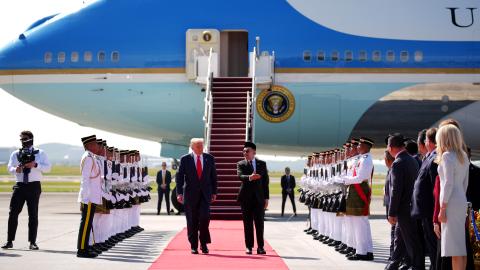As Donald Trump boards Air Force One for the first East Asia trip of his second term, he is confronting the main challenge facing the United States and the one that will define his legacy: the ongoing competition with China. There are reasonable grounds for optimism in the White House, but fending off the communist great power will require tremendous focus and determination. If handled well, this trip will set the rest of his term up for success in the Far East.
For much of this year, Trump and Xi Jinping have circled each other like heavyweights in the early rounds of a prize fight, tentatively jabbing without unleashing a haymaker. China discreetly supplied Iran’s military with rocket materials and Tehran’s Arab minions with intelligence, and the United States enabled Israel to devastate Iran’s proxies, missile arsenal, and nuclear program.
Much as Henry Kissinger and Richard Nixon did during the first Cold War, Trump is using Israeli power adeptly to establish himself as the final arbiter of the Middle East. Regional capitals that want to make progress on issues ranging from Gaza’s fate to the region’s rapidly shifting balance of power must send emissaries to the White House. Beijing’s earlier diplomatic forays, such as the Saudi-Iranian pact it presided over on Joe Biden’s watch, pale in significance.
Trump’s attempt to end the war Vladimir Putin started in Ukraine is faring less well, but recent American moves unsettled Beijing. Trump is using the war with some success to force the European establishment to wake up to the increasingly threatening geopolitical environment. Trump also canceled a planned summit with Putin after concluding new peace talks with him would be a "waste of time," but the subsequent Russian bombing offensive shows Moscow is unbowed. The president’s newly announced sanctions on oil giants Rosneft and Lukoil, the first of this term against Russia, are roiling markets and drew alarmed rebukes from China’s foreign ministry.
The first stop of Trump’s Asia tour, to Malaysia for the annual Association of Southeast Asian Nations (ASEAN) summit, takes him right to the heart of the contest with China. Beijing is determined to draw the region into its orbit, and it has largely used economic inducements to do so. After it mishandled the initial COVID outbreak in Wuhan, though, Western firms adopted a "China plus one" sourcing strategy, and many shifted production to Southeast Asia. The United States is now the area’s top export destination.
This development matched the traditional U.S. strategy for Asia, of building up favored countries by offering access to American consumers, but Trump thinks that strategy has run its course. Trade wars make ASEAN leaders nervous, and many of them lament the Liberation Day tariffs. They need economic growth and will embrace Trump to the extent he enables it.
His next stop highlights one of this year’s most promising developments: In Japan, he will meet Sanae Takaichi, the new prime minister. Takaichi is a disciple of Shinzo Abe, the farsighted Japanese leader who pushed his country to confront Chinese malfeasance and won Trump’s admiration. Takaichi intends to carry on this work, and Trump and Treasury Secretary Scott Bessent hailed her elevation. If she and Trump develop a bond even half as strong as the one Abe and Trump enjoyed, Xi will suffer a significant setback.
The real showdown will occur at the end of the trip, when Trump and Xi are scheduled to meet in South Korea. In addition to their geopolitical jabbing, both leaders are preparing body blows to launch against the other’s economy.
Xi has a powerful array of moves to use against the United States. He previously toyed with cutting off American access to rare earth elements, which despite their name, are not particularly rare but are overwhelmingly mined and refined in China. In early October, he tightened restrictions on those exports, which threatens to cripple domestic high-tech manufacturing. U.S. officials also accuse China of reneging on its previous commitments to buy American agricultural products, such as soybeans.
Trump has some counters of his own. He announced another 100 percent tariff rate increase in response to Xi’s new export controls and is reportedly threatening to block other important goods-and-services exports. Just before departing for Asia, Bessent told reporters, "everything is on the table" regarding China.
The president struck a more conciliatory note and said on Wednesday, "I think we'll make a deal" with Xi. He seems more interested in reaching an understanding on issues like trade, the Ukraine war, and nuclear arms control than in a long and expensive confrontation with China, but he may not get it. Xi did not honor the terms of the first-term trade deal, and he has a long history of breaking agreements with U.S. presidents.
Trump will need all of his dealmaking prowess when he meets Xi. Setting himself up for success in the leadup to South Korea is vital.


















